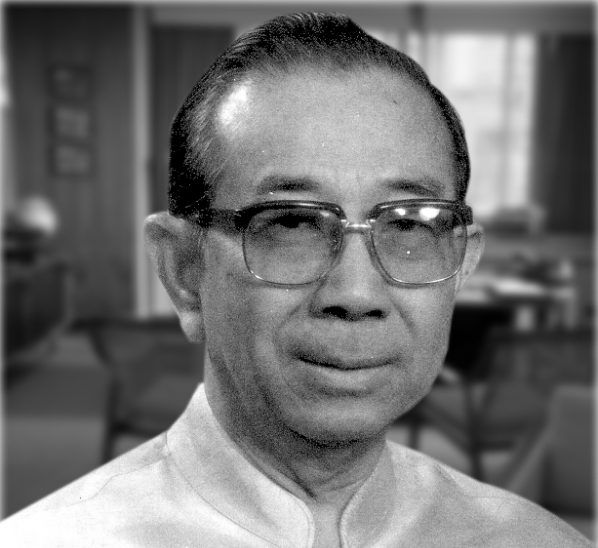- From 1976 AREE tackled protein-energy malnutrition (PEM), the most serious form of malnourishment among Thailand?s rural children.
- His effective advocacy encouraged adoption by the Ministry of Health of integrated, community-based nutritional programs in Thailand.
- His internationally respected curriculum emphasizes disease prevention and requires medical students to learn techniques of community diagnosis and planning.
- The RMAF board of trustees recognizes his contribution in improving the diets and promoting the good health of millions of Thai children.
More than a billion young people today begin life crippled by poor diets. Even in Thailand, which exports food, more than half of all infants and preschool children suffered from malnutrition as recently as 1980. Lacking healthy bodies and alert minds, malnourished children reinforce the tenacious cycle of ignorance and poverty. As a medical scientist Dr. AREE VALYASEVI has investigated this vexing problem for 27 years.
AREE received his medical education at Siriraj Hospital Medical College in Bangkok and subsequently studied advanced pediatrics and nutrition at the University of Pennsylvania in the United States. He first became aware of the deficient health and diets of rural Thais while conducting a countrywide nutritional survey in 1960. What he saw prompted him to abandon his newly begun private practice to pursue research devoted to rural public health.
Intrigued by the high incidence among poor children in northeast Thailand of painful and debilitating bladder stone disease, AREE traced the cause to minerally imbalanced diets, combined with mild dehydration induced by heat, chronic diarrhea, vomiting and fever. He found that phosphate-rich dietary supplements could reduce bladder stone formation. This preventive measure is now used in other countries where bladder stone disease is prevalent.
From 1976 AREE tackled protein-energy malnutrition (PEM), the most serious form of malnourishment among Thailand?s rural children. With his colleagues and students at Mahidol University’s Institute of Nutrition — which he helped found in 1976 — AREE devised palatable protein energy-rich food mixes for infants. Made from locally available beans, sesame seeds and groundnuts, these mixes can be manufactured cheaply by the villagers themselves. When introduced in Nong Hai Village, his pilot site, the percentage of normal healthy children rose from 45 to 79 in eight months.
AREE discovered that it is “essential to integrate health care, agriculture and income generation into the nutritional package.” The means of improvement, he adds, “must be in the villagers’ own hands.” His effective advocacy encouraged adoption by the Ministry of Health of integrated, community-based nutritional programs in Thailand. Since 1981 such programs have been incorporated into national development plans and introduced, along with AREE’s food mixes, to some 12,500 villages. The incidence of PEM has declined by half, and third-degree malnutrition, the severest level of malnutrition, is 62 times rarer today than 10 years ago.
A colleague describes 61-year-old AREE as a visionary who “works, works, works.” Aside from research and teaching he has authored or coauthored several medical textbooks and more than 78 scientific papers, and has served on numerous commissions and agencies. As Founding Dean of Ramathibodi Medical School (1968 to 1977), AREE introduced a comprehensive course on community health. His internationally respected curriculum emphasizes disease prevention and requires medical students to learn techniques of community diagnosis and planning. It also encourages young doctors to stay in rural practice following the two years the government requires of them. Some one-third of Ramathibodi’s graduates have done so, giving Thailand, with AREE’s guidance, a new generation of doctors for a new generation of healthier children.
In electing Dr. AREE VALYASEVI to receive the 1987 Ramon Magsaysay Award for Community Leadership, the Board of Trustees recognizes his contribution in improving the diets and promoting the good health of millions of Thai children.
Today I am very thrilled and honored to be here to receive the 1987 Ramon Magsaysay Award for Community Leadership.
This prestigious Award is universally known to be given in recognition of persons who contribute in various ways to human societies in accordance with the ideals of Ramon Magsaysay.
Most developing countries in Asia are facing similar health and nutritional problems as a result of poverty, social injustice, improper feeding habits, poor sanitation, lack of safe water and inadequate health care facilities. The leading causes of children’s death in developing countries are still malnutrition and infections of various kinds. These unfortunate children get caught in a vicious cycle of malnutrition and frequent infections, absence from schools or work, illiteracy and poverty. When these children become parents it is likely that their offspring will enter the same vicious cycle.
Solutions to these important and urgent problems must be found and something must be done to remedy the situation; knowledge and experiences gained in one country can be shared with others. It is our hope that malnutrition will gradually disappear by the turn of this century. All of want to live in a world where man can live with man in honor and peace. This is, in fact, the spirit and aspiration of the great leader, Ramon Magsaysay.
I would like to take this opportunity to express my sincere gratitude to the members of the Board of Trustees of the Ramon Magsaysay Award Foundation for selecting me for the Award and inviting me here. However, my work is not possible without the enthusiastic support of my staff at Mahidol University’s Faculty of Medicine, Ramathibodi Hospital, and the Institute of Nutrition. I thank them and I would like to thank also the agencies which have given generous support for my work during the past 25 years.

